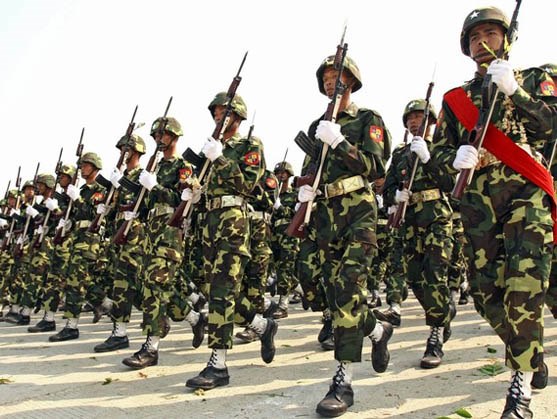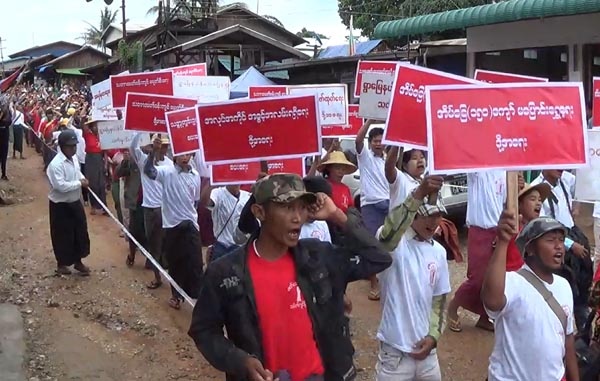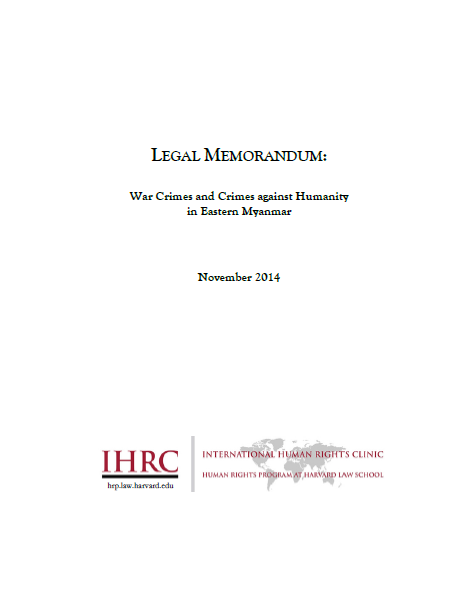Posts Tagged ‘Ministry of Home Affairs’ (7 found)
Myanmar: Strike Down Mandatory Houseguest-Registration
(Yangon, August 31, 2016)—Myanmar’s Parliamentary Bill Committee should remove provisions in a colonial-era law that require citizens to register overnight houseguests with the authorities, 52 Myanmar civil-society organizations, including Fortify Rights, said today in a joint statement in Burmese and English languages […]
• • •Impunity for Military Abuses Has to End
 On 7 November, the International Human Rights Clinic (the Clinic) at Harvard Law School published a Legal Memorandum which establishes that certain Burma Army commanders are guilty of crimes against humanity and war crimes under international criminal law. The Legal Memorandum submits its findings on the basis of a three-year investigation (the Investigation) into human rights abuses associated with a Burma Army offensive in Karen State, which was launched in late 2005 and continued into 2008 (the Offensive). The Clinic chose this offensive “because it was one of the largest in recent memory and was widely condemned by the international community.” The Investigation focused specifically on the conduct of two military units – Southern Regional Military Command (SRMC) and Light Infantry Division 66 (LID 66) – in Thandaung Township, Karen State.
On 7 November, the International Human Rights Clinic (the Clinic) at Harvard Law School published a Legal Memorandum which establishes that certain Burma Army commanders are guilty of crimes against humanity and war crimes under international criminal law. The Legal Memorandum submits its findings on the basis of a three-year investigation (the Investigation) into human rights abuses associated with a Burma Army offensive in Karen State, which was launched in late 2005 and continued into 2008 (the Offensive). The Clinic chose this offensive “because it was one of the largest in recent memory and was widely condemned by the international community.” The Investigation focused specifically on the conduct of two military units – Southern Regional Military Command (SRMC) and Light Infantry Division 66 (LID 66) – in Thandaung Township, Karen State.
Articles 7 and 8 of the Rome Statute of the International Criminal Court (ICC) set out the legal requirements for an action to qualify as a “crime against humanity” or a “war crime,” respectively. The essence of a “crime against humanity” is that the act in question should be “part of a widespread and systematic attack directed against any civilian population, with knowledge of the attack.” Similarly, Article 8 stipulates that a “war crime” must be committed “as part of a plan or policy or as part of a large-scale commission of such crimes,” and must constitute a grave breach of the Geneva Conventions 1949, which regulate the conduct of armed conflict […]
• • •Legal Memorandum: War Crimes and Crimes Against Humanity in Eastern Myanmar
In January 2011, the Harvard Law School International Human Rights Clinic (“the Clinic”) began to investigate the actions of the Myanmar Army during a military offensive in eastern Myanmar (“the Offensive”) that began in late 2005 and lasted approximately three years. The Clinic sought to determine whether violations of international criminal law occurred during the Offensive, and whether there exist reasonable grounds to assert that individual military officers could be held responsible for those crimes. The Clinic’s investigation focused specifically on the conduct of two military units—Southern Regional Military Command (“Southern Command”) and Light Infantry Division 66 (“LID 66”)—in Thandaung Township, Kayin State. […]
• • •PRESS RELEASE: Harvard Law School Implicates Senior Myanmar Officials in War Crimes and Crimes Against Humanity
Yangon, Myanmar-A four-year investigation by the International Human Rights Clinic at Harvard Law School has found that the Myanmar military committed war crimes and crimes against humanity in 2005-2006, and that perpetrators, including the current Home Affairs Minister, continue to serve at the highest levels of the country’s government […]
• • •Myanmar: Further Information: Activist Organization Targeted again
Two members of the Movement for Democracy Current Force (MDCF) have been given jail terms for peacefully exercising their rights to freedom of expression and peaceful assembly. They must be immediately and unconditionally released. Charges against a third person, who is married to one of the MDCF members and was exercising her right to peaceful protest, should be dropped […]
• • •BURMA: Killing of Mr. Aung Kyaw Naing
The Observatory for the Protection of Human Rights Defenders, a joint programme of the International Federation for Human Rights (FIDH) and the World Organisation Against Torture (OMCT), requests your urgent intervention in the following situation in Burma […]
• • •Over 1,000 in Mandalay Protest Mining Activities
 The mining sector in Burma continues to receive flak, with protestors taking to the streets in Wetthay and Phetshay villages in Thabeikkyin, Mandalay.
The mining sector in Burma continues to receive flak, with protestors taking to the streets in Wetthay and Phetshay villages in Thabeikkyin, Mandalay.
On 30 August, the villagers protested against the encroaching mining activities on village land and the displacement of more than 150 households. Aimed at gold mining companies such as Myanmar Golden Pwint, Shwe Pyi Thar and Htarwarra, along with other metal mining companies in the region, the protestors condemned the breaching of boundary lines by these companies and expanding mining activities onto legally recognized village land […]
• •









 All posts
All posts